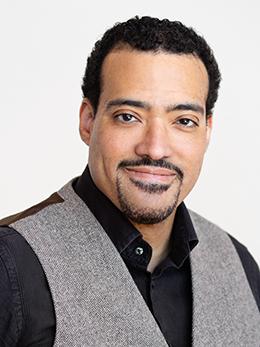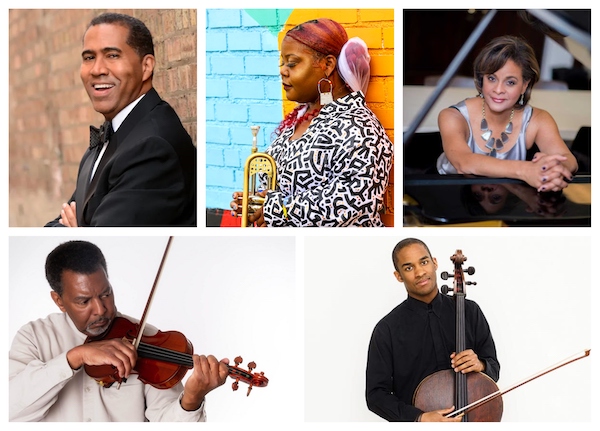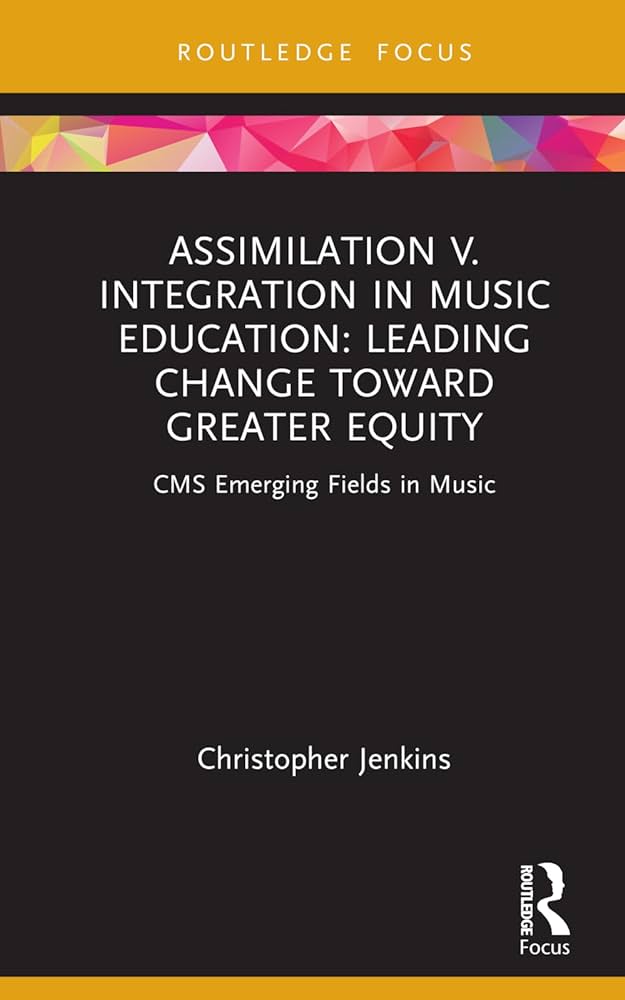by Jarrett Hoffman

Collaborating in a piece by H. Leslie Adams in January 2020 for a concert at The Music Settlement honoring Martin Luther King, they realized that White-Gould’s parents — composer-pianist Dolores White and cellist Donald White — had performed together as a duo decades earlier in the very same space.
More ties came to mind between past and present, time and place. “We thought, it’s so interesting to be here,” Jenkins (pictured) said during a recent interview over Zoom. “Leslie is here, and Dianna’s parents have played in this space, and we’re here now. Leslie and Dianna went to Oberlin, and her mother went to Oberlin and CIM, and I work at Oberlin.” (Jenkins is the Associate Dean for Academic Support, Visiting Assistant Professor of Musicology, and Liaison to the Office of Equity, Diversity, and Inclusion). “All those connections — it was so interesting.”
The thought of those connections led to the creation of Linking Legacies, a chamber collective headed up by Jenkins that features multiple generations of African American classical musicians performing classical works by African American composers — with a focus on deep ties to the area for both performers and composers.
And speaking of the area, there are three opportunities to see Linking Legacies perform next week in Northeast Ohio — all free.
On Wednesday, February 7 at 6:00 pm, they will be featured on the Cleveland Museum of Art’s “Chamber Music in the Galleries” series. The setting will be Gallery 229A, where they will find themselves in the company of the painting He was meant for all things to meet by Amy Sherald, who is known for her portraits of Black Americans.
On Thursday, February 8 at 7:30 pm, they will head to Oberlin Conservatory for a faculty and guest chamber music concert in Kulas Recital Hall.
Then on Friday, February 9 at 7:00 pm, the group will perform at the University Circle campus of The Music Settlement (that concert is now sold out).
The personnel and programming will vary slightly from one evening to the next, partly the result of space and availability, and partly by design, as a collective that can shift in shape — and that continues to expand.
Jenkins noted that two of the performers — violinist John McLaughlin Williams and trumpeter Theresa May — were in the audience at a Linking Legacies concert last year at The Music Settlement. “They heard us and said hi. Then I reached out to them and said, ‘Hey, would you play with us? Because that’d be really fun.’”
Other performers featured on these concerts include cellist Khari Joyner and tenor Cornelius Johnson, as well as White-Gould on piano and Jenkins on viola.

Clockwise from top-left: Johnson, May, White-Gould, Joyner, and Williams.
“I think most of all, it’s just fun for us to get together,” Jenkins said. “We have a really good time. It’s not often that you get to play just with other Black musicians.”
The programs encompass works by Adolphus Hailstork, Coleridge-Taylor Perkinson, Khari Joyner (who will play his own solo cello piece at CMA), William Grant Still, Nkeiru Okoye, H. Leslie Adams, Samuel Coleridge-Taylor, and Dolores White, as well as a set of vocal selections that includes spirituals as well as music by Ralph Vaughan Williams.
“There are just so many Black composers who have been educated at schools like Oberlin, CIM, and Wilberforce, and people tend not to know that,” Jenkins said. “It really has to do with the area’s legacy as a stop on the Underground Railroad. That’s why there’s this rich history of Black culture and community in this part of the state, and in many parts of the state.”
He credited White-Gould with coining the name Linking Legacies. “It’s a genius name, because that’s really what we’re doing, and what is special about this project for us.”

The text centers around the question of what it means for conservatories and orchestras to diversify Western classical music. Jenkins argues that changing the demographics of those involved is not enough.
“If there are more Black and brown faces on stage, that’s not a more diverse practice of this art form. You’ve just changed who’s doing it. Plus you have to assimilate us into these systems, because to some extent they are aesthetically and culturally alien. Real diversity requires that we change the practice and pedagogy of classical music,” he told me.
The values and customs of the orchestral world, Jenkins said, do not often mesh with Black expressive culture, “which is about spontaneity, improvisation, responsiveness, personality, and individuality in the context of a community. So when it’s hard to get Black players into orchestras, it’s not just because of the racism in the scene, which is there. It’s not just because there are not enough of us getting training. The aesthetics do not appeal, and the structure does not appeal.”
From his ensemble to his book, as well as the work he does at Oberlin and at The Music Settlement (where he is Head of Musical Community Engagement in addition to teaching violin and viola) — perhaps it isn’t surprising that Jenkins was one of the recipients of The Cleveland Orchestra’s 2024 Dr. Martin Luther King, Jr. Service in the Arts Awards. Presented as part of the Orchestra’s 44th annual MLK Celebration Concert last month, the award recognizes “those whose work has a positive impact on music and the arts in our community, reflecting the spirit, example, and teachings of Dr. King.”
So, when I saw Jenkins on Zoom, congratulations were in order. “That was a really great moment,” he said. “My dad always used to say it is nice to get some recognition sometimes. And a lot of what I do at Oberlin is particularly difficult, I would say — working with students who have various academic, social, and emotional issues. So it was really nice to be honored, especially in that way, with the Black community of Cleveland, really, as an audience. It was very special.”
Published on ClevelandClassical.com February 1, 2024.
Click here for a printable copy of this article



